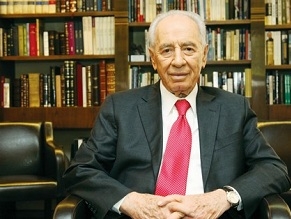|
World Jewish News

President Shimon Peres Photo: Marc Israel Sellem
|
Peres: Iran to be key topic in Obama's Israel trip
11.02.2013, Israel and the World While pundits pontificate over what will be discussed between US President Barack Obama and Israel's leadership when Obama arrives in Jerusalem next month, President Shimon Peres left no doubt that Iran will be one of the key topics on the table.
In a wide ranging address on Monday to the Conference of Presidents of Major American Jewish Organizations which is convening in Israel this week, Peres said the American policy on Iran has worldwide impact, "but Israel is the candidate at the top of the list to meet the consequences of Iranian policy."
Peres reiterated his previously expressed belief that Obama is serious in his determination to prevent an Iranian nuclear state from becoming a fact. In preventing Iran from becoming a nuclear power said Peres, the US is acting not only on behalf of Israel, "but because of security in our times."
The other issue to be explored during the Obama visit centers on the chances for peace said Peres. who was hopeful that Obama's visit "will open a new chapter" not only in American-Israeli , which he declared to be unique despite occasional differences, but also in relations between Israel and the Palestinians and Israel and Jordan. Peres was optimistic about the possibility of renewing dialogue between Israel and the Palestinians on the one hand, and Israel, the Palestinians and the Jordanians on the other. "I believe there is a chance," he said. "In spite of our differences, we want to live in peace. I don't expect this to happen in one visit, but it will be a beginning."
In reviewing the general situation in the Middle East, Peres said that the situation is much more complicated than ever before, and certainly more complicated than it was before the so-called Arab Spring, even though what has happened since has nothing to do with Israel. Nonetheless, it does affect Israel, he said.
He cited Syria as an example, observing that if Syrian President Bashar Assad disappears, no-one knows what might happen next.
Pointing to the general lack of stability in the region, Peres noted that there is hardly anything by way of government in Syria, in Iraq, in Libya or in Yemen, while in Egypt the Moslem Brotherhood is being tested on its ability to overcome problems of economy, employment and freedom.
The Arab world invested a lot in education while neglecting to invest simultaneously in industries that would provide jobs for university graduates said Peres.
On the local scene, Peres referred to the difficulties in hammering out a coalition agreement because not all the potential coalition partners agree on certain issues, but he was confident that in the final analysis a government will be formed.
At question time Peres was asked whether he would make another appeal to Obama for the release of convicted spy Jonathan Pollard.
When Peres did make an appeal on humanitarian grounds some ten months ago, his request was supported by Richard J. Stone Chairman and Malcolm Hoenlein Executive Vice Chairman of the Conference of Presidents who had visited Pollard in prison and had come away concerned about his health. They had sent a letter to Obama entreating that Pollard's sentence be commuted.
However on Monday, Peres evaded the question, and went off on a tangent about the complications related to forming a government.
The President's Spokeswoman Ayelet Frish later told The Jerusalem Post that Peres had met several weeks ago with Esther Pollard and members of the Justice for Pollard Committee and had reaffirmed his commitment to do everything in his power to secure Pollard's release.
Some people interpreted his evasion of the question as a diplomatic ploy designed to avoid embarrassing the American administration. The Pollard activists are anxious for Peres to raise the subject with US Secretary of State John Kerry whose own visit to Israel will precede that of President Obama.
Throughout his address, Peres punctuated his remarks with frequent comments about America being a great power that achieved more with generosity than other nations achieved with aggression. He also called Obama a great leader who had changed America and who was interested in progress.
This is the 39th annual visit to Israel by the Conference of Presidents. Its concerns at this time as outlined by Hoenlein are America-Israel relations, Israel's security, how to overcome the deterioration in Israel-diaspora relations, changes in the Middle East, the geopolitics of the Jewish People , Israel's new social agenda, problems related to illegal aliens, unity and divisiveness in Jerusalem and where Israel is heading with high tech.
By GREER FAY CASHMAN
JPost.com
|
|
